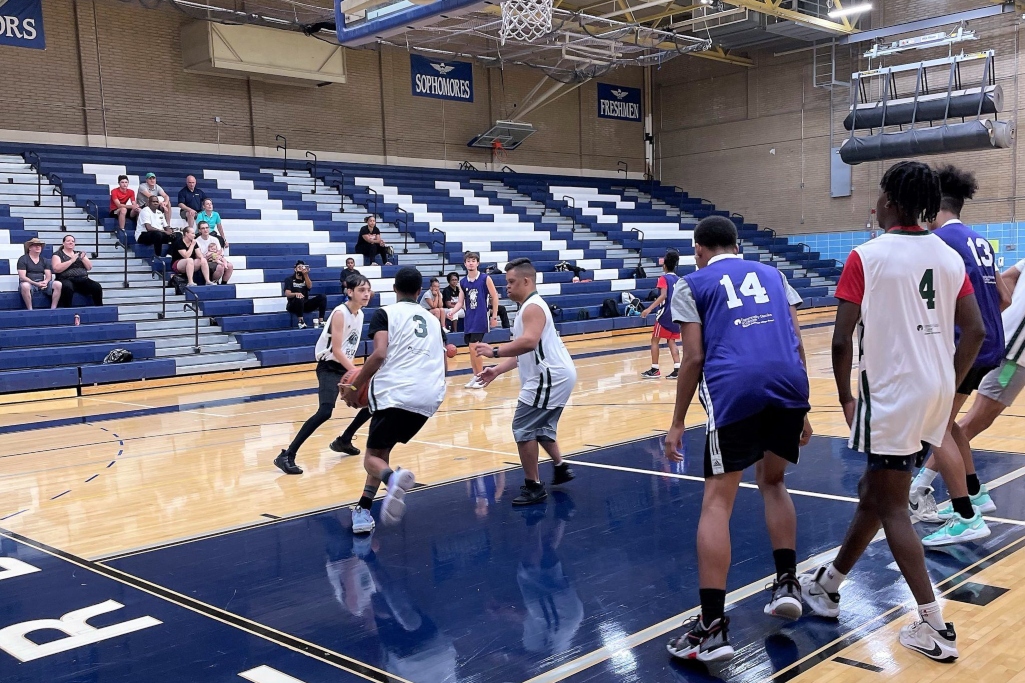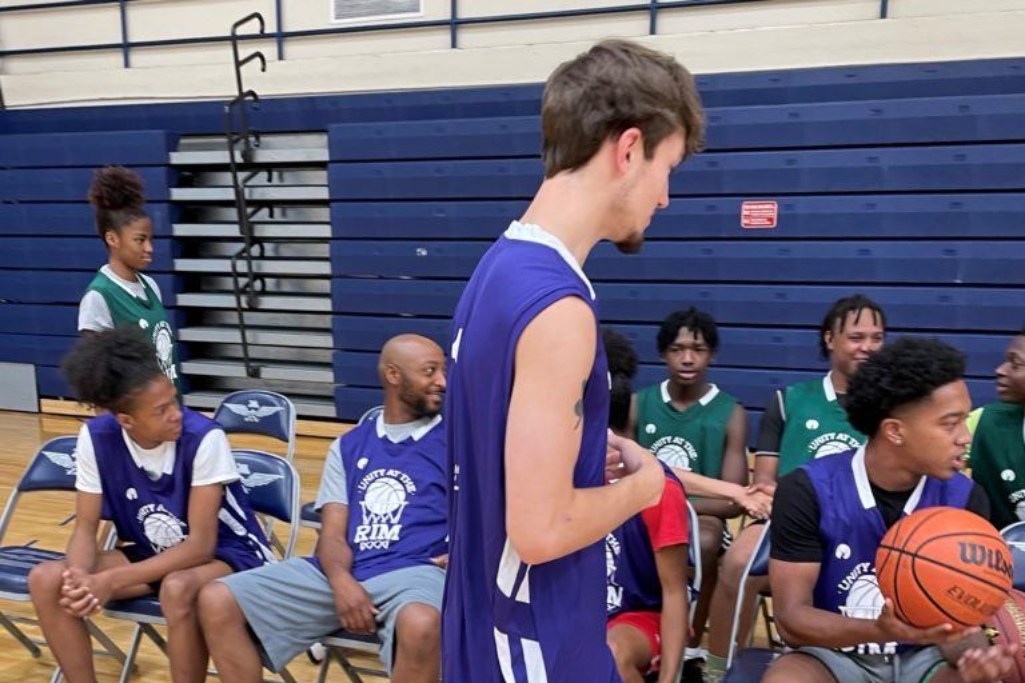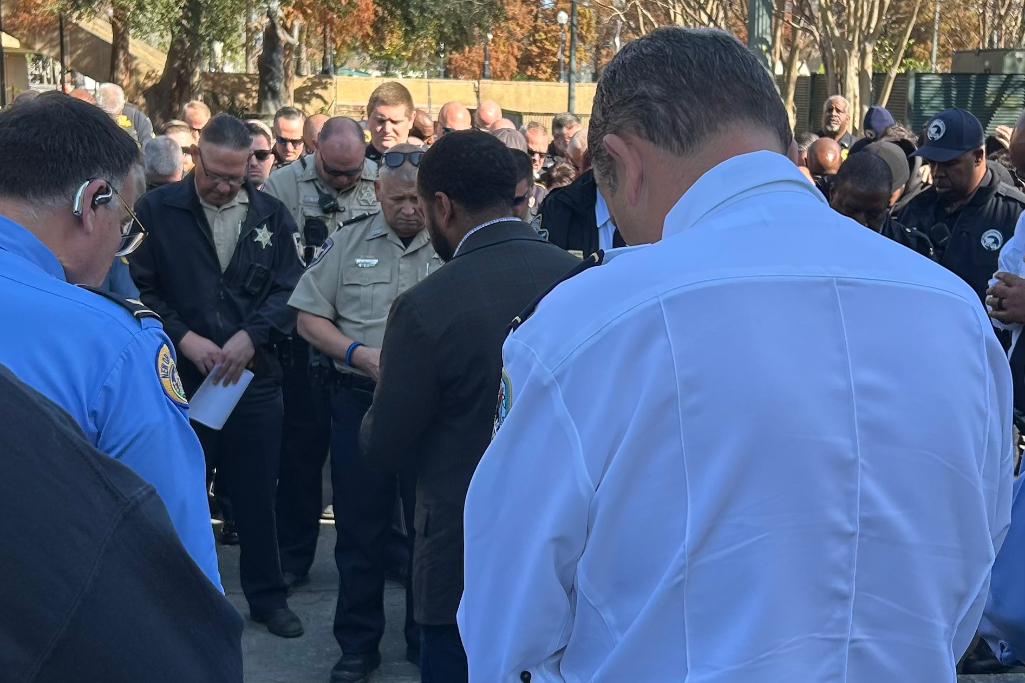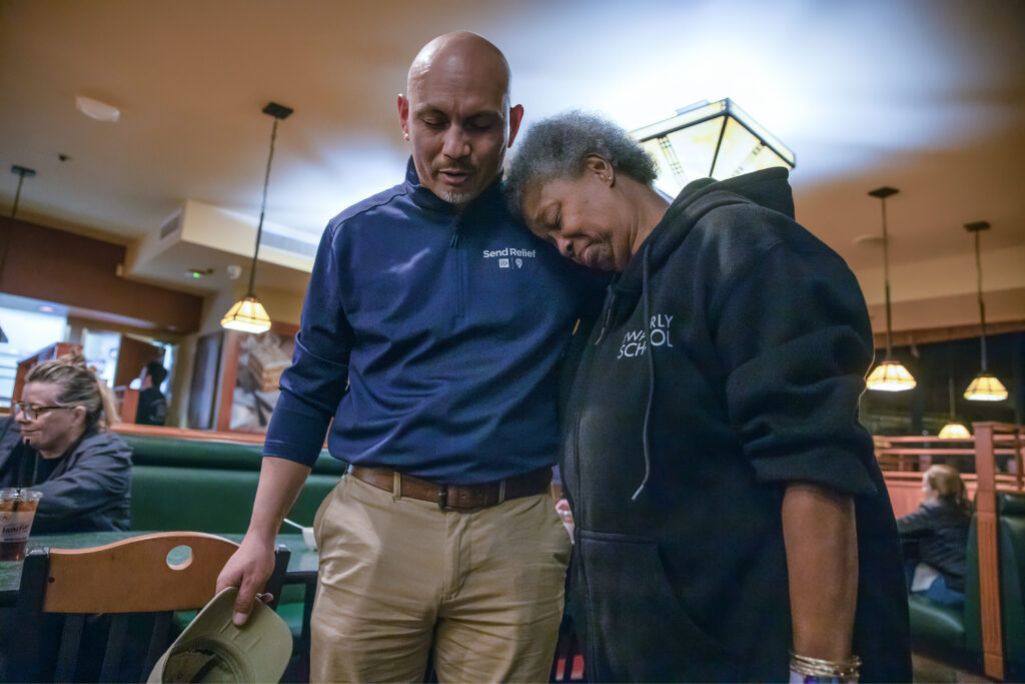
Lee Hall at 2021 Unity at the Rim. Grace Christian Center Senior Pastor Lee Hall, third from right, with police officers who participated in the 2021 Unity at the Rim basketball tournament and rap session to improve relations between first responders and youth.
White pastor Mark Spence understands the challenges Black drivers face caused by what many call “driving while black,” or DWB. In advance of the Unity at the Rim basketball event to build bridges between first responders and diverse youth, Spence relates an experience of about 20 years ago.
“I was in the car with a friend who was pulled over ‘cause he was driving my nice car, and he was African American, and he was doing nothing wrong. So I’ve had that experience, being in the passenger seat while he got pulled over for DWB,” said Spence, senior pastor of Mississippi Avenue Baptist Church in Aurora, Miss. “But at the same time, I’ve never had to worry about it, and these other pastors have.
“Guys who love the Lord, who are good citizens. There’s no sense of any wrongdoing, and yet they’ve had bad experiences before with police, or with first responders.”
Lee Hall, an African American and senior pastor of Grace Christian Center in Denver, Colo., and Spence are Southern Baptist pastors who have worked to build cross cultural bridges in the Denver metroplex since tragedies including the 2019 death of Elijah McClain after a police encounter, and the 2020 police murder of George Floyd.
When communities were marching to protest the deaths of McClain and Floyd, Hall and Spence corralled a denominationally and ethnically diverse group of pastors to address racial profiling by first responders, hoping to build bridges and improve relations between Denver metroplex first responders and youth.
Unity at the Rim, a July 30 co-ed basketball tournament and rap session between first responders and youth, is a result of their work in its second year, Hall said. Pastors from Missionary Baptist, Church of God in Christ, Assemblies of God and nondenominational congregations are active in the outreach.
“We thought that the best way to reach the community was to reach it through our young people. They’re more open. And at the same time, we’ve seen the police come out to the community and our youth take off running,” Hall said. “That’s not a good thing to see.
“We want them to not only be comfortable around police, but at the same time, we want the police to begin to recruit our young people to become police officers in the future as well. We thought it best to bring them together, play together … to begin a dialogue.”
More than 110 youth and 25 first responders had registered for Unity at the Rim through July 27, Hall said, including about half a dozen firefighters.


Contributed photos Left, racially diverse police officers, firefighters and youth play basketball in the first Unity at the Rim event aimed at improving relationships between youth and first responders in Denver in 2021. Right, both male and female youth and first responders participate in Unity at the Rim.
Denver Police Department Community Relations Officer LaTrisha Guss, who has recruited about 10 departmental officers to participate, expressed appreciation for the pastors’ work in building community relationships.
“We definitely love our houses of worship. They’re the same community members that we’re trying to address and fellowship with and communicate with and build those bridges with,” Guss said. “The fact that Pastor Lee Hall was excited about allowing us to partner with him and be able to build that relationship is phenomenal. We also participate in other functions with houses of worship, such as the Faith & Blue.”
Such work is more important now than ever, Guss said.
“Unfortunately, law enforcement has kind of been involved in situations that are not appealing. There have been some unfortunate tragedies that have come out of law enforcement and things of that sort, and community engagement, now more than ever, is important because we need to be able to strengthen that relationship with the people that we serve,” Guss said. “Communities of color have always struggled with law enforcement. It’s definitely our personal mission to make sure that we can fix that gap and just get the community and law enforcement together on the same page, supporting one another and encouraging one another to be the best that we can in order to combat crime and work together as a unit.”
Unity at the Rim will begin with co-ed basketball matchups, prayer and a moderated one-hour rap session. Youth and first responders will explore such questions as how they view one another, ways of improving relationships and policing, how to handle police encounters and building trust.
“How can we create change, and change the image that kids see when they see cops,” Hall asked, ‘and at the same time, when a police officer comes into the community, are you coming to arrest, are you coming to handcuff or are you coming to really connect and figure out what’s really going on?
“I know you guys have jobs to do,” he said of first responders, “but a lot of our kids are innocent. They’re just walking while Black and somebody called the police on them. We’re just trying to break down walls, so police understand that the community is human. We want to relate. We hope you want to relate to us as well. And together we can build some bridges where you can have a police officer pick up a basketball and shoot it, or race a kid. Just anything that will create kids feeling comfortable when policing happens in a neighborhood.
Recruiters will also be on hand to recruit youth to law enforcement. The event, supported financially by the Colorado Baptist Convention, is easily replicable in other communities, Hall believes.
In addition to Unity at the Rim, pastors have been intentionally meeting monthly, praying together and building friendships for more than a year.
Spence said the communication and new relationships, expanded his circle of friends beyond an echo chamber and diversified his friendships.
“I think one of the biggest challenges we face in this issue is one of these echo chambers. We tend to surround ourselves with people who believe like we believe, think like we believe,” Spence said. “My pastor friends are not anymore just white, or just Southern Baptist. It’s much more diverse, which helps challenge my conventional thinking on issues.”
He better understands his encounter with police nearly 20 years ago, Spence said, despite having been in the car as his Black friend was driving.
“I had a very nice sports car. And he was driving it, and I was in the passenger seat. And we were just driving through a nice residential area and he got pulled over, and the police officer was not happy that he was in that neighborhood, driving that car,” Spence said. “And we asked the officer, ‘did we do anything wrong,’ and there was nothing. The police officer asked whose car is this, and I was just like, ‘sir it’s mine. And that’s my house right over there.’
“Thankfully it [didn’t escalate], but it was very clear to us. My friend … was in a nice neighborhood and driving a very nice sports car, and the police officer felt like he shouldn’t be,” Spence recalled. “At the time, I didn’t really understand it. There wasn’t a light shined on those incidents like they are now. Even then, I didn’t know and (my friend) didn’t know–he grew up in the same neighborhood–he wasn’t aware of DWBs either.
“But as time has gone on,” Spence said, “I see what it is now. Now, I can tell what happened then. And that story has been shared over and over by friends of mine who have had that same experience.”
(EDITOR’S NOTE – Diana Chandler is Baptist Press’ senior writer.)


